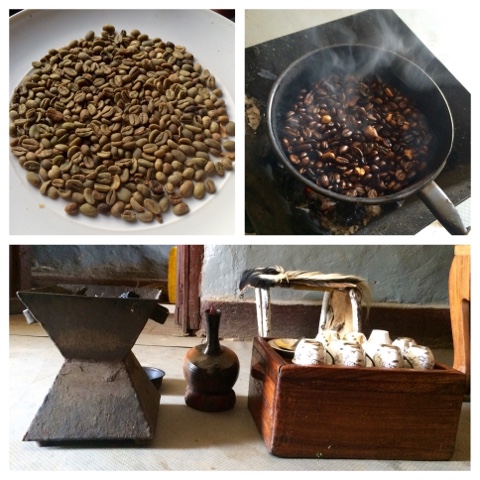In a few days I will find out my site placement and then spend a week there to get acquainted. My host family is concerned about me going to a (more) rural area and not being as comfortable or having the things I need. My host mother is concerned about who will feed me especially since I don't know how to make injera (biddeena). I gently tried to remind her that for most of my life I have not eaten injera with my meals. I hope she is not planning to send me off with a week's supply! They have very sweetly said that they hope my site is close so they can check on me, if not they hope they happen to have relatives near my site so they can take care of me.
Yesterday I made buna (coffee). I think in one of previous posts I mentioned the important part buna plays in Ethiopian culture. My host parents have been asking me when I'm going to do it for awhile now but it's quite the process and the time just hasn't been right. It's become a joke in the family that I say "tarii boru" (maybe tomorrow) a lot. They ask if I'm going to make coffee after I've been in training all day - I say tarii boru... They really want me to eat a mango but I'm not quite sure my stomach is up for it - I say tarii boru... They really want me to drink a soda but I don't want one and they won't accept no for an answer - I say tarii boru... Saying 'no' directly is not accepted but using 'maybe tomorrow' has worked well for me! So now whenever I try to say 'no' they say 'tarii boru' and we all laugh. Of course my host sister helped me make buna, I definitely wouldn't have been successful alone. First step is to get the charcoal stove going, next wash the green coffee beans and pick out any of them that are not good. Then roast the beans in a pan over the stove. There is a special way to shake the pan and toss the beans to ensure they roast evenly - I'm not good at it. The sound of the sizzling beans and of course the accompanying aroma is almost worth the effort. Next it's time to grind the beans, this is my favorite part! As you can see from the picture, it means smashing them by hand. A great way to get out any aggression. Then after heating water in the jebena (traditional clay kettle), add the ground coffee and let it steep for a bit. Finally ready to be served! Simply pour into the traditional cups (sini) with a hefty dose of sugar (even if you ask for a little, it's still a lot!). It tasted pretty good, but again I had a lot of guidance from my host mother and sister.
I live across the street from a hair salon. It's just like you'd imagine. Several darling young women work there and throughout the day other women will stop by sometimes just to chat. Since its just across the street sometimes they call me over to hang out with them or if I'm on my way to or from class they will call out to greet me, I feel like a celebrity!
Last weekend we took a day trip to a resort in Sodere. It involved several hours on a bus but it was nice to see more of the country. It is along a river and there are a lot of monkeys there so that was fun.













